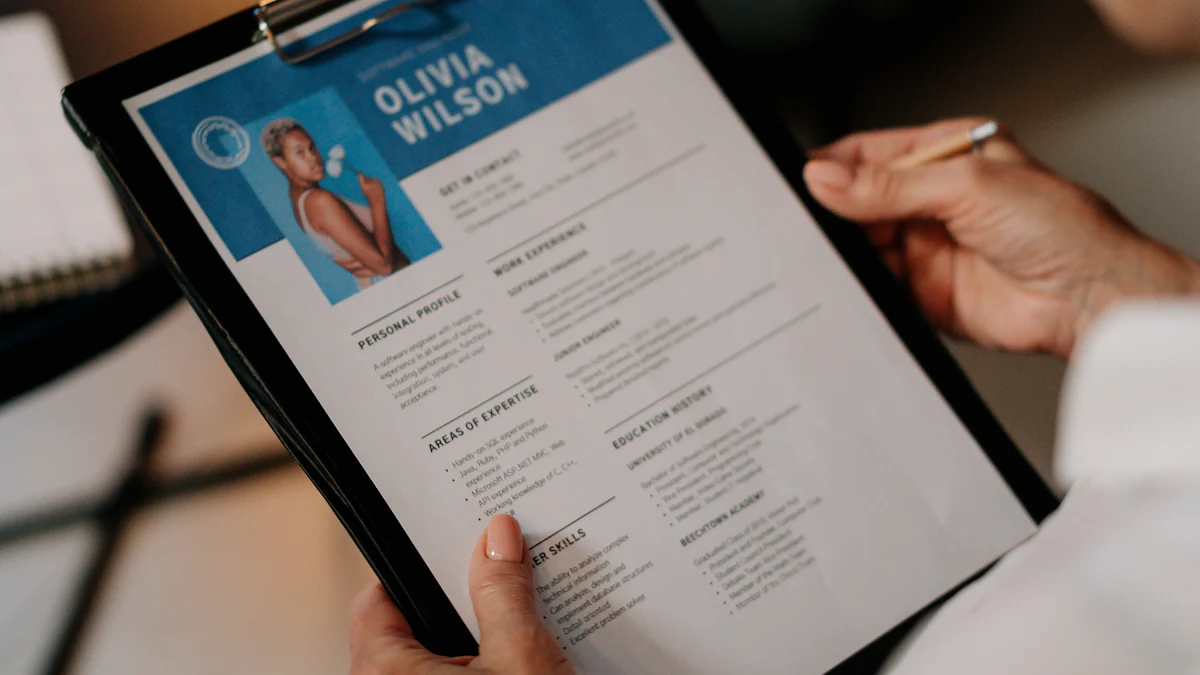How to Prepare for the Meta iOS Engineer Interview in 2025
Try Aihirely for
Smarter Interview Prep
Experience real-time AI support tailored to your Resume.
Boost your confidence and ace every question with
AI Mock Interview.

Image Source: pexels
Preparing for the Prepfully Meta iOS interview can seem daunting, but it doesn’t have to be. You’ll encounter challenges such as technical coding questions, system design interviews, and behavioral assessments. Each phase evaluates your skills in distinct ways, making thorough preparation essential. Whether it’s excelling in Swift, designing scalable systems, or demonstrating strong teamwork, preparation is key to building confidence. The Prepfully Meta iOS interview process rewards candidates who dedicate time to refining their technical, design, and communication skills. With the right approach, you can confidently face every challenge and distinguish yourself as a standout candidate.
Key Takeaways
-
Learn about the interview steps. Know the recruiter call, coding tests, and in-person interviews.
-
Get good at coding and algorithms. Study key data structures and solve coding problems on sites like LeetCode or HackerRank.
-
Make an impressive portfolio. Share your iOS projects on GitHub and show you can write clear code and create APIs.
-
Use the S.T.A.R. method for behavior questions. Answer by explaining your actions and what you achieved.
-
Plan your time well. Make a schedule to practice coding, design, and behavior questions.
Understanding the Meta iOS Engineer Interview Process

Image Source: pexels
Preparing for the prepfully meta ios interview starts with understanding the process. Each stage evaluates different aspects of your skills, so knowing what to expect can help you prepare effectively.
Key Stages of the Interview
Recruiter Screening and Initial Discussion
The first step is a conversation with a recruiter. This stage doesn’t have a set duration, but it’s your chance to make a strong first impression. The recruiter will ask about your background, experience, and interest in the role. They’ll also share details about the position and the interview process. Be ready to explain why you’re excited about working at Meta and how your skills align with the role.
Technical Phone Screen
This stage typically lasts 45-60 minutes. You’ll solve coding problems while explaining your thought process. The interviewer might ask questions about algorithms, data structures, or iOS-specific topics. Practice solving problems on a shared coding platform to get comfortable with this format.
Onsite Interview (Coding, Design, and Behavioral Rounds)
The onsite interview, also called the full loop, is the most comprehensive stage. It usually takes 4-6 hours and includes multiple rounds. You’ll tackle coding challenges, discuss system design, and answer behavioral questions. Each round assesses a specific skill, so balanced preparation is key.
Here’s a quick overview of the stages and their durations:
| Stage | Duration |
|---|---|
| Recruiter Screen | N/A |
| Technical Phone Screen | 45-60 minutes |
| Onsite or Full Loop Interview | 4-6 hours |
What Meta Looks for in Candidates
Meta seeks candidates who bring a mix of technical expertise, problem-solving skills, and collaboration abilities. Here’s what they prioritize:
-
At least one year of experience building complex iOS applications.
-
Proficiency in Objective-C, C++, or Swift, along with a deep understanding of the iOS SDK.
-
A history of writing maintainable, testable code and designing APIs.
-
Familiarity with multithreading and mobile memory management.
-
A Bachelor’s degree in Computer Science or equivalent practical experience.
To stand out in the prepfully meta ios interview, focus on showcasing these qualities through your projects and past experiences. Highlight your ability to solve problems, write efficient code, and work well with others.
Technical Preparation for the Meta iOS Engineer Interview
Coding and Algorithm Mastery
Mastering coding and algorithms is a must for the prepfully meta ios interview. You’ll need to focus on essential data structures like arrays, trees, graphs, and hashmaps. These are the building blocks for solving complex problems. Spend time practicing algorithms such as binary search, sorting, and dynamic programming. Platforms like LeetCode, HackerRank, and CodeSignal are excellent for consistent practice.
Create a study plan that spans 6-8 weeks. Start with medium-level problems and gradually tackle harder ones. This approach builds confidence and sharpens your problem-solving skills. Mock interviews can also help you articulate your thought process, which is crucial during the technical phone screen.
iOS-Specific Technical Knowledge
Your expertise in iOS development will be under the spotlight. Focus on core frameworks like UIKit, SwiftUI, and Core Data. These are essential for building robust iOS applications. You should also have a strong grasp of Objective-C, C++, or Swift, along with the iOS SDK.
Debugging and performance optimization are equally important. Test your app on real devices to catch issues that emulators might miss. Use Xcode’s profiling tools regularly to monitor performance. Automated testing with XCTest ensures your app remains stable and efficient. Don’t forget to optimize image handling and monitor memory usage to avoid leaks.
Debugging is all about ensuring your app runs smoothly. Tools like Xcode Debugger and LLDB Commands will be your best friends during this process.
Building a Portfolio That Stands Out
A standout portfolio can set you apart in the prepfully meta ios interview. Showcase your personal iOS projects on GitHub. Highlight apps you’ve published on the App Store, especially those with complex features or innovative designs.
Your portfolio should reflect your ability to write maintainable, testable code. Include examples of API design and unit testing techniques. If you’ve worked on multithreading or memory management, make sure to emphasize that. These skills demonstrate your readiness to tackle real-world challenges at Meta.
Design Preparation for the Meta iOS Engineer Interview

Image Source: pexels
System Design for Mobile Applications
Scalable architecture and mobile-specific considerations
When designing scalable mobile applications, you need to focus on creating a solid foundation. Start with a scalable architecture like microservices or serverless models. These allow individual components to scale independently, which is crucial as your app grows. Load balancing is another key factor. It ensures traffic is distributed evenly across servers, preventing bottlenecks and keeping performance steady. Efficient caching strategies also play a big role. By storing frequently accessed data closer to users, you can reduce server load and improve response times. Finally, don’t overlook database optimization. Choosing the right database and fine-tuning queries can significantly enhance your app’s scalability and performance.
APIs, databases, and caching strategies
APIs act as the backbone of your app’s communication. Design them to be efficient and secure. Use REST or GraphQL depending on your app’s needs. For databases, consider whether a relational or NoSQL database fits better. Relational databases work well for structured data, while NoSQL is ideal for unstructured or rapidly changing data. Caching strategies, such as using tools like Redis or Memcached, can speed up data retrieval and reduce latency.
Real-world system design examples
Real-world challenges often test your ability to handle app lifecycle events like pausing and resuming. You’ll also need to ensure compatibility across various devices and screen sizes. Managing global application states, such as permissions and connectivity changes, is another common hurdle. Addressing these challenges effectively shows your readiness for the prepfully meta ios interview.
Product Design and User Experience
User-centric design principles
Great product design starts with the user. Focus on creating intuitive interfaces that solve real problems. Keep navigation simple and ensure accessibility for all users.
Discussing trade-offs and design decisions
Every design decision comes with trade-offs. For example, adding a feature might improve functionality but increase complexity. Be ready to explain your choices and how they align with user needs.
Recommended resources for product design
To sharpen your skills, explore resources like “Don’t Make Me Think” by Steve Krug or online courses on platforms like Coursera. These can help you master user-centric design and make informed decisions.
Behavioral Preparation for the Meta iOS Engineer Interview
Structuring Responses with the S.T.A.R. Framework
The S.T.A.R. framework (Situation, Task, Action, Result) is your best friend for answering behavioral questions. It helps you organize your thoughts and deliver clear, concise responses. Start by describing the situation and task to set the context. Then, explain the actions you took and the results you achieved. This structure makes your answers impactful and easy to follow.
Here are some common behavioral questions you might face:
-
Describe a time when you had to resolve a dispute with a teammate.
-
What’s the most challenging problem you’ve solved?
-
Tell me about a time you failed. What did you learn?
-
Give an example of a time you disagreed with a colleague or manager. How did you handle it?
For example, if asked about a disagreement with a colleague, you could say:
“We scheduled a meeting to discuss our perspectives. By listening to each other, we found common ground and created a solution that worked for both of us.”
Aligning with Meta’s Leadership Principles
Meta values collaboration, impact, and openness. To align with these principles, share experiences that highlight teamwork, problem-solving, and adaptability. For instance, talk about a time you inspired your team or solved a complex issue under pressure. Show how your actions created a positive impact.
Meta’s bottom-up culture also values leadership. Even if you’re not in a formal leadership role, demonstrate how you’ve motivated others or resolved conflicts. For example, you might share how you led a project, navigated challenges, and delivered results.
Practicing Through Mock Interviews
Mock interviews are a game-changer. They simulate real interview scenarios, helping you build confidence and refine your answers. Practice with peers or mentors who can provide constructive feedback. Focus on improving your communication, body language, and clarity.
Use feedback wisely. Prioritize areas for improvement and apply changes in your next practice session. If you notice recurring themes, address them to eliminate persistent weaknesses. Over time, you’ll see tangible progress and feel more prepared for the prepfully meta ios interview.
Final Tips and Resources for Success
Managing Your Time Effectively
Creating and sticking to a preparation schedule
Time management is your secret weapon for acing the prepfully meta ios interview. Start by creating a preparation schedule that breaks down your study goals into manageable chunks. For example, dedicate specific days to coding practice, system design, and behavioral questions. Stick to this schedule like it’s a meeting with your future self. Consistency will help you build momentum and avoid last-minute cramming.
Balancing technical, design, and behavioral practice
Balance is key. Don’t spend all your time on coding while neglecting design or behavioral prep. Allocate time to each area based on your strengths and weaknesses. If coding is your strong suit, spend extra time refining your system design skills. Use mock interviews to practice switching between technical and behavioral questions. This will prepare you for the dynamic nature of Meta’s interview process.
Recommended Resources for Preparation
Books like “Cracking the Coding Interview” and “iOS Programming: The Big Nerd Ranch Guide”
Books are a great way to deepen your understanding. Here’s a quick list of highly recommended titles:
| Title | Description |
|---|---|
| Cracking the Coding Interview by Gayle Laakmann McDowell | A must-read for mastering coding interviews. |
| iOS Programming: The Big Nerd Ranch Guide | Comprehensive guide to iOS development. |
| System Design Interview by Alex Xu | Practical strategies for system design questions. |
| Designing Data-Intensive Applications by Martin Kleppmann | Insights into scalable, data-driven systems. |
Online courses on platforms like Udemy and Coursera
Online courses can fill in knowledge gaps. Platforms like Udemy and Coursera offer courses tailored to iOS development and interview prep. Look for courses with hands-on projects to apply what you learn.
Meta’s career page and blogs for insights
Meta’s career page and blogs are goldmines of information. Use them to:
-
Learn about Meta’s culture and values.
-
Understand the interview process, including technical screens and coding challenges.
-
Prepare examples that align with Meta’s key competencies, like leadership and adaptability.
Staying Confident and Motivated
Focusing on progress over perfection
Perfection isn’t the goal—progress is. Celebrate small wins, like solving a tricky coding problem or completing a mock interview. These victories show you’re moving in the right direction.
Celebrating small wins during preparation
Recognize your achievements, no matter how small. Did you get an interview invite? That’s a big deal! It means your resume stood out. Even setbacks are opportunities to learn and grow. Reflect on what went well and what you can improve.
Remember, confidence comes from preparation. The more you practice, the more ready you’ll feel when the big day arrives.
Preparing for the prepfully meta ios interview takes effort, but you’ve got this! Start by building at least a year of hands-on experience with iOS apps. Strengthen your skills in Swift, Objective-C, or C++, and dive deep into the iOS SDK. Practice coding problems, focus on algorithms, and refine your behavioral answers using the S.T.A.R. framework. Stay consistent with your schedule and celebrate small wins along the way. Remember, preparation isn’t just about hard work—it’s about working smart with the right resources. Keep pushing forward, and you’ll be ready to shine!
FAQ
1. How long should I prepare for the Meta iOS Engineer interview?
It depends on your current skill level. Most candidates spend 6-12 weeks preparing. Focus on coding, system design, and behavioral questions. Create a schedule and stick to it.
2. What coding platforms are best for practice?
LeetCode and HackerRank are excellent choices. They offer a variety of problems that match the difficulty of Meta’s interview. CodeSignal is another great option for practicing timed challenges.
3. Do I need to know Objective-C for the interview?
Not necessarily. Swift is the primary language for iOS development. However, knowing Objective-C can give you an edge, especially if the role involves maintaining legacy code.
4. How can I improve my behavioral interview skills?
Practice using the S.T.A.R. framework. Write down examples from your past experiences and rehearse them. Mock interviews with peers or mentors can help you refine your responses.
5. What if I don’t have apps published on the App Store?
That’s okay! Focus on showcasing your personal projects on GitHub. Highlight features that demonstrate your technical skills, like API integration, multithreading, or performance optimization.
Tip: Stay consistent with your preparation. Small, daily efforts add up and make a big difference over time.
